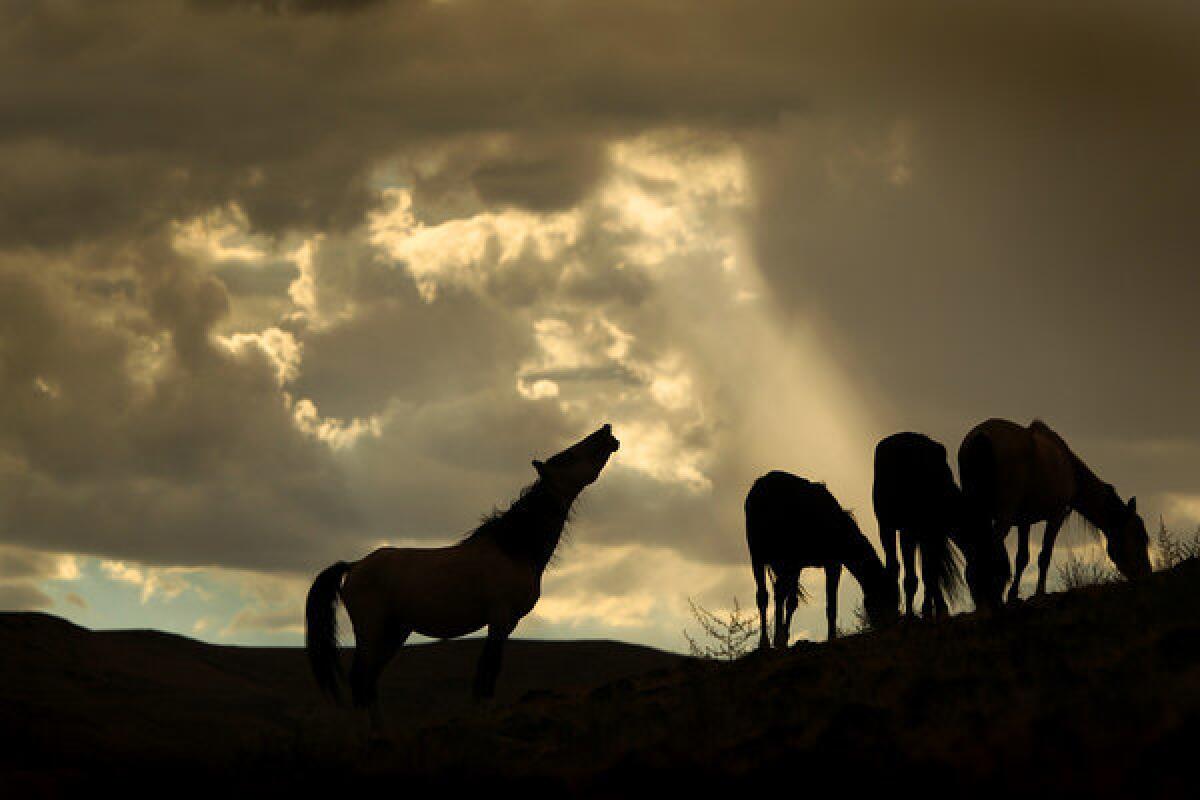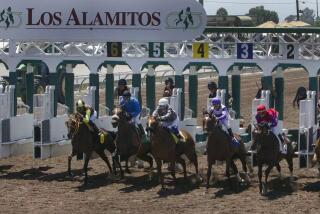Judge halts action on unbranded horses in Nevada

LAS VEGAS -- If those horses don’t have a brand, you can’t sell them.
That was a message delivered by a federal judge to a Nevada animal auction house, the latest development in the fate of 486 horses rounded up for sale by a Native American reservation -- horses that animal rights activists say deserve protection by the federal government.
Late Friday, a federal court judge in Reno granted advocates a temporary restraining order to block the sale of unbranded horses at a slaughter auction in rural Fallon.
The action could postpone an auction for the horses set for today.
Activists sued to stop the sale of unbranded horses who were captured last weekend on the Ft. McDermitt Pauite-Shoshone reservation in northern Nevada, alleging that unbranded horses in the group were likely federally-protected wild horses originating from the nearby Bureau of Land Management (BLM) Little Owyhee Herd Management Area.
The battle is the latest showdown between the federal government and animal advocates over the wild horses that wander the American West.
Tribal officials say the animals were traditional pests that cost them money to maintain. But wild horse advocates claim that many of the animals were wild mustangs that should have been protected by the federal BLM under the 1973 Wild Horse and Burro Act.
Laura Leigh, founder of Wild Horse Education, filed a lawsuit in U.S. District Court in Nevada claiming that the BLM participated in the roundup instead of protecting the horses as the law requires.
It also alleged that wild horses were removed through an agreement with tribal authorities, the U.S. Forest Service and the BLM. Many unbranded wild horses were removed, including those in an area of BLM-managed public land, it says.
On Friday, U.S. District Court Judge Miranda M. Du found Leigh’s lawsuit had merit.
“Plaintiffs have shown serious questions … that wild horses were improperly rounded up during the gather from August 11-13, 2013,” she wrote in her order. “Plaintiffs have demonstrated an immediate threat of irreparable harm if the status quo is not maintained, that is the sale of wild horses and their possible slaughter.”
The ruling added: “The public interest is served when the court maintains the status quo to ensure wild horses are not improperly removed and auctioned for sale to potentially be slaughtered because of an agency action.”
Leigh told the Los Angeles Times that many of the horses collected may have been from BLM-managed land traveling in their normal seasonal migratory patterns.
“Sometimes the fight to protect our wild horses is difficult and complex. This decision shows that when we all work together and stay the course, we can achieve our mutual goals,” she said in a press release posted on her website. “I am proud to be part of this effort. Together, we can turn this around to save America’s mustangs on our public lands in the West.”
She said any horses auctioned Saturday would probably be purchased by so-called kill buyers, who would ship them to slaughterhouses in Mexico. Such slaughterhouses in the U.S. were closed in 2007, but there have been recent court battles over whether to allow such slaughter to resume in the U.S.
Other advocates applauded the judge’s action.
“Judge Du has stepped in to do what the federal government refused to do: act to prevent federally protected wild horses from being sold at a slaughter auction,” said Suzanne Roy, director of the American Wild Horse Preservation Campaign. “We are grateful for this federal court decision, but remain outraged by the federal government’s complicity in this dirty operation that has sentenced hundreds of horses to horrific deaths at slaughterhouses in Canada and Mexico.”
The BLM has denied that any wild horses were taken off the range.
JoLynn Whorley, a spokeswoman for the agency’s Nevada office, told the Los Angeles Times that the tribe collected horses last week, but said the BLM was not part of the effort.
“If these were our horses, we would step up and take responsibility for them. We’ve always done that,” she said. “Our position is that these animals aren’t horses managed by the BLM and are not protected by law. They are animals that have been on tribal land for decades.”
But Maxine Sart, tribal chairwoman for the Ft. McDermitt Paiute-Shoshone reservation, told The Times that several hundred horses were rounded up from tribal territory. She added that a BLM observer was on hand during the process.
Leigh began her court battle to observe and protect wild horses in the BLM’s Owyhee Herd Management Area in 2010 and has filed numerous court actions alleging the agency’s mistreatment of wild horses under its program to remove some mustangs from the range and put them up for adoption.
Currently, the BLM has stockpiled 50,000 wild horses on Midwest farms -- more than the total that remain on the range.
ALSO:
Ft. Hood testimony: ‘We began to blindly exchange fire’
At Seattle pot fest, police to protect — and serve tortilla chips
Chris Christie supports allowing medical marijuana for children
More to Read
Sign up for Essential California
The most important California stories and recommendations in your inbox every morning.
You may occasionally receive promotional content from the Los Angeles Times.











